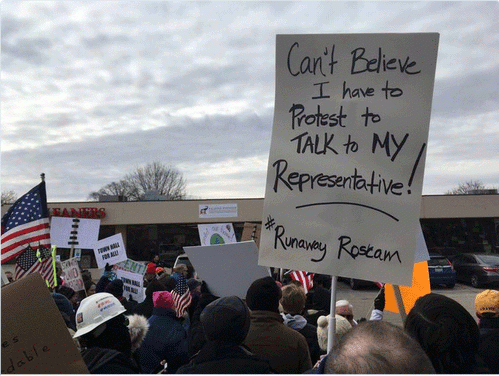
This sixth grade student is held to a higher standard than the United States Department of Health and Human Services. CREDIT: AP Photo/Ty Wright.
The devil is in the details, so it’s said. There’s such a constant thower of thit, to quote Igor, that it’s very easy to miss the smaller things, the fine mitht of the thit thower, as Igor might say. First is the news that our current health regulators aren’t good at math. At all.
…Thus, for example, a fifth grade student is expected to understand that the number “3.49” is greater than the number “3.” The Trump administration, however, appears to be struggling with this concept.
Under the Affordable Care Act, “the premium rate charged by a health insurance issuer for health insurance coverage offered in the individual or small group market . . . shall not vary by more than 3 to 1 for adults” due to the age of the person seeking insurance. In other words, insurers may charge older consumers (who tend to have more health problems and thus are more expensive to cover) up to three times more than younger individuals, but no more than three times as much.
Nevertheless, according to the Huffington Post’s Jonathan Cohn, the Department of Health and Human Services (HHS) submitted a proposal which would permit insurers to charge older customers premiums that are “3.49 times as large as those for younger customers.” This proposal would be a federal rule, not a new law, so HHS apparently hopes to implement it without changing the law saying that insurers can only charge older customers 3 times as much, not 3.49 times as much.
According to Cohn, HHS would argue that this is okay because “3.49 ‘rounds down’ to three.”
If you find yourself prone to shrugging over this, have a second think. 3 and 3.49 might not seem like a big deal, but when you’re going to be charged that difference financially, it’s a big difference. It’s a difference which could determine whether or not you can afford healthcare. Full story at Think Progress.

Prepaid cash and credit cards have been a gold rush for the financial industry — and not everyone in the business plays fair with customers. CREDIT: AP Photo/Swayne B. Hall, File.
In a very quiet move, consumer protections are going to be removed from pre-paid debit cards, and this will disproportionately affect those who are poor. We all know how much the GOP cares about poor people.
…But prepaid debit card companies are suddenly holding a get-out-of-jail-free card, courtesy of Sen. David Perdue (R-GA). Perdue is pushing legislation to override and permanently derail the CFPB’s three-month-old rules package for the cards, reviving even the most deceptive practices over expert advice to the contrary.
Prepaid debit cards now account for tens of billions of dollars in financial activity each year, creating a giant profit opportunity for the financial companies that issue cards to consumers. One Federal Reserve report in 2014 found the average customer pays $15 to $17 in fees each month on the cards, and that fees skew higher for customers who are black, younger than 15, widowed, or living in areas with relatively high rates of violent crime.
[…]
Only one major provider of prepaid cards charges overdraft fees. NetSpend, which does most of its business by partnering with storefront payday lenders, is uniquely reliant on the most deceitful species of fee-for-service practices.
Again, CFPB’s rule doesn’t bar the overdraft charges; it just forces companies to be honest and forthright about them. NetSpend couldn’t stand that sunlight. NetSpend and its parent company, Georgia-based TSYS, say they would lose some $80 million a year if consumers were finally protected from its policies.
Perdue and his co-sponsors say their move to end consumer protections for prepaid cards is about preserving access for consumers. The fact that it is also an $80 million favor to an unsavory financial company based in his state—and a thumb in the eye of the millions of people who have turned to the cards as a substitute for traditional bank accounts — is apparently a coincidence.
This will have a devastating effect on way too many people, and it’s doubtful most people will even be aware of this, and won’t be able to employ more vigilance against those looking to rob the poor and mire them into never-ending debt. Think Progress has the full story.

















